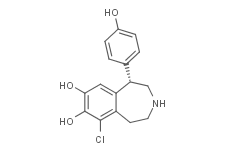
Fenoldopam mesylate
CAS No. 67227-57-0
Fenoldopam mesylate( Fenoldopam, Corlopam, SK and F-82526J )
Catalog No. M18977 CAS No. 67227-57-0
Fenoldopam is a selective dopamine-1 receptor (DA1) agonist with natriuretic/diuretic properties. It lowers blood pressure through arteriolar vasodilation.
Purity : >98% (HPLC)
 COA
COA
 Datasheet
Datasheet
 HNMR
HNMR
 HPLC
HPLC
 MSDS
MSDS
 Handing Instructions
Handing Instructions
| Size | Price / USD | Stock | Quantity |
| 10MG | 39 | In Stock |


|
| 25MG | 74 | In Stock |


|
| 50MG | 138 | In Stock |


|
| 100MG | 199 | In Stock |


|
| 200MG | 305 | In Stock |


|
| 500MG | Get Quote | In Stock |


|
| 1G | Get Quote | In Stock |


|
Biological Information
-
Product NameFenoldopam mesylate
-
NoteResearch use only, not for human use.
-
Brief DescriptionFenoldopam is a selective dopamine-1 receptor (DA1) agonist with natriuretic/diuretic properties. It lowers blood pressure through arteriolar vasodilation.
-
DescriptionFenoldopam mesylate is a synthetic benzazepine derivative which acts as a selective D1 receptor partial agonist. Fenoldopam is used as an antihypertensive agent. It was approved by the Food and Drug Administration (FDA) in September 1997. Since fenoldopam is the only intravenous agent that improves renal perfusion, in theory it could be beneficial in hypertensive patients with concomitant renal insufficiency.(In Vitro):Fenoldopam is a partial agonist with low efficacy at DA1 receptors linked to cAMP generation in the LLC-PK1 cells.Fenoldopam (0-300 μM; 48 or 72 h) displays significant antiproliferative activity against RCC cell lines.Fenoldopam (5 μM and 10 μM; 72 h) induces cell apoptosis in a dose-dependent manner.(In Vivo):Fenoldopam mesylate (subcutaneous injection; 100 mg/kg; once daily; 2 d) can induce arteritis in rats detected by magnetic resonance imaging (MRI).
-
In VitroFenoldopam is a partial agonist with low efficacy at DA1 receptors linked to cAMP generation in the LLC-PK1 cells.Fenoldopam (0-300 μM; 48 or 72 h) displays significant antiproliferative activity against RCC cell lines. Fenoldopam (5 μM and 10 μM; 72 h) induces cell apoptosis in a dose-dependent manner. Cell Proliferation Assay Cell Line:786-O, ACHN, and HK-2 cells Concentration:0-300 μM Incubation Time:48 or 72 hours Result:Inhibited the growth of ACHN cells (IC50=16.55 μM, 48 h; IC50=10.34 μM, 72 h), 786-O cells (IC50=57.89 μM, 48 h; IC50=47.52 μM, 72 h), and HK2 cells (IC50>300 μM, 48h and 72 h).Apoptosis AnalysisCell Line:ACHN cells Concentration:5 μM and 10 μM Incubation Time:72 hours Result:Increased apoptotic cells from at 2.2% (control) to 47.7% (5 μM, fenoldopam) and 60.8% (10 μM, fenoldopam), respectively.
-
In VivoFenoldopam mesylate (subcutaneous injection; 100 mg/kg; once daily; 2 d) can induce arteritis in rats detected by magnetic resonance imaging (MRI). Animal Model:Female Sprague-Dawley rats Dosage:100 mg/kg Administration:Subcutaneous injection; 100 mg/kg; once daily; 2 days Result:Showed low-intensity areas and a high signal intensity region around the artery, and these findings were considered to be erythrocytes infiltrating the arterial wall and perivascular edema, respectively.Observed perivascular edema histopathologically.
-
SynonymsFenoldopam, Corlopam, SK and F-82526J
-
PathwayOthers
-
TargetOther Targets
-
Recptordopamine-1 receptor
-
Research AreaCardiovascular Disease
-
Indication——
Chemical Information
-
CAS Number67227-57-0
-
Formula Weight401.86
-
Molecular FormulaC16H16ClNO3·CH4O3S
-
Purity>98% (HPLC)
-
SolubilityDMSO : ≥ 36 mg/mL 89.58 mM; H2O : 10 mg/mL24.88 mM
-
SMILESCS(O)(=O)=O.OC1=CC=C(C=C1)C1CNCCC2=C(Cl)C(O)=C(O)C=C12
-
Chemical Name9-chloro-5-(4-hydroxyphenyl)-2,3,4,5-tetrahydro-1H-3-benzazepine-7,8-diol
Shipping & Storage Information
-
Storage(-20℃)
-
ShippingWith Ice Pack
-
Stability≥ 2 years
Reference
molnova catalog



related products
-
Punicalagin
Punicalagin is a major ellagitannin found in pomegranates that is reported to produce antioxidant, anti-inflammatory, and anticancer effects.
-
Bonducellin
Bonducellin has anti-inflammatory activities, it can significantly and dose-dependently inhibit the inflammatory mediators; nitric oxide (NO), and cytokines [tumor necrosis factor (TNF)-alpha and interleukin (IL)-12.
-
2R,4S-Sacubitril
2R,4S-Sacubitril is the impurity of Sacubitril which is a neprilysin inhibitor.



 Cart
Cart
 sales@molnova.com
sales@molnova.com


